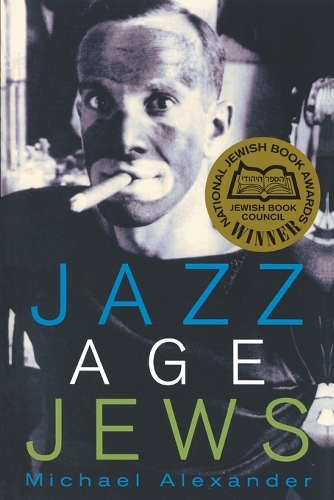
Jazz Age Jews
(Paperback)
Publishing Details
Jazz Age Jews
By (Author) Michael Alexander
Princeton University Press
Princeton University Press
10th November 2003
United States
Classifications
Professional and Scholarly
Non Fiction
Social groups: religious groups and communities
973.004924
Winner of Jewish Book Council National Jewish Book Award: Jewish-Christian Relations 2002
Physical Properties
Paperback
264
Width 152mm, Height 229mm
369g
Description
By the 1920s, Jews were - by all economic, political, and cultural measures of the day - making it in America. But as these children of immigrants took their places in American society, many deliberately identified with groups that remained excluded. Despite their success, Jews embraced resistance more than acculturation, preferring marginal status to assimilation. The stories of Al Jolson, Felix Frankfurter, and Arnold Rothstein are told together to explore this paradox in the psychology of American Jewry. All three Jews were born in the 1880s, grew up around American Jewish ghettos, married gentile women, entered the middle class, and rose to national fame. All three also became heroes to the American Jewish community for their association with events that galvanized the country and defined the Jazz Age. Rothstein allegedly fixed the 1919 World Series - an accusation this book disputes. Frankfurter defended the Italian anarchists Sacco and Vanzetti. Jolson brought jazz music to Hollywood for the first talking film, "The Jazz Singer", and regularly impersonated African Americans in blackface. Each of these men represented a version of the American outsider, and American Jews celebrated them for it. Michael Alexander's account complicates the history of immigrants in America. It challenges charges that anti-Semitism exclusively or even mostly explains Jews' feelings of marginality, while it calls for a general rethinking of positions that have assumed an immigrant quest for inclusion into the white American mainstream. Rather, Alexander argues that Jewish outsider status stemmed from the group identity Jews brought with them to this country in the form of the theology of exile. "Jazz Age Jews" shows that most Jews felt culturally obliged to mark themselves as different - and believed that doing so made them both better Jews and better Americans.
Reviews
Winner of the Jewish Book Award in Jewish Christian Relations, Jewish Book Council National "A fascinating study... Jazz Age Jews covers its subject without padding or pedantry... A book that takes strong, interesting positions on how the Jews made their way into mainstream America."--Sanford Pinsker, Philadelphia Inquirer "[A] deft and provocative book... [Alexander] paints a vivid portrait of popular anti-Semitism of the time... His arguments in the first two sections are dazzling... Alexander's commentary is elucidating and insightful, an important contribution to both Jewish and cultural studies."--Publishers Weekly "As [Alexander] points out, of all America's ethnic minorities, only the Jazz Age Jews seemed to care for the downtrodden in other groups... If this is revisionist history, I like it."--Michael Freedland, Jewish Chronicle "Alexander's genial and generally jargon-free book offers a provocative portrait of how Jazz Age Jews understood their Jewishness."--Lev Raphael, The Jerusalem Report "Jazz Age Jews is an accessible and informative contribution to the ongoing dialogue about American Jewish acculturation in the early part of the twentieth century."--Andrea Most, American Jewish History
Author Bio
Michael Alexander is Assistant Professor of History and Jewish Studies at the University of Oklahoma.
